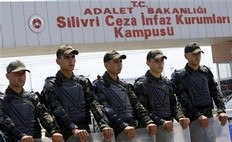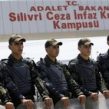
Coup Debate Resurfaces in Turkey Following the Third Ergenekon Indictment
Publication: Eurasia Daily Monitor Volume: 6 Issue: 151
By:

The prosecutors investigating the Ergenekon criminal network that allegedly aimed at overthrowing the Turkish government by organizing a military coup, has finalized the third indictment, consisting of 1,454 pages and indicting 52 high profile individuals. The judges hearing the Ergenekon trial accepted the indictment and announced that the trial will begin on September 7.
The evidence collected for the third indictment indicates a conspiracy to organize a military coup against the Justice and Development Party’s (AKP) government. Prosecutors accused the Ergenekon network of planning at least 10 assassinations against leading figures in society in order to create chaos as a first step toward staging a military coup. The Turkish press highlighted these assassination plans as one of the main pillars of the indictment. According to the indictment the targets included Prime Minister Tayyip Erdogan, supreme court judges in Ankara, NATO facilities in Izmir, the former Chief of the General Staff General Yasar Buyukanit, the journalist Fehmi Koru and a Nobel Prize winning author Orhan Pamuk, as well as Kurdish nationalist politicians including the Chairman of the Democratic Society Party (DTP), Ahmet Turk, the Mayor of Diyarbakir, Ocman Baydemir, and DTP deputy Sebahat Tuncel, Armenian businessman Minas Durmaz Guler, Armenian Orthodox Church patriarch Mesrob Mutafyan, and the leaders of the Alevi communities Ali Balkiz and Kazim Genc (Milliyet, August 6).
Since the start of the Ergenekon investigation the Alevi communities, who oppose the AKP government, argued that the government is using the case as a tool to suppress opposition groups. The Alevi communities were also the most vocal opposition against the Ergenekon investigation. However, as the evidence provided in the third indictment appears to involve the Alevi leaders, Ali Balkiz and Kazim Genc, they have applied to the court as victims of the Ergenekon network (Radikal, August 6). In one of his earlier statements Balkiz revealed that the prosecutors invited him to reveal evidence about the assassination plot against him. Balkiz stated that this including a sketch showing his home and the daily routes that he uses to travel to work, and the place where the assassination might occur. He is also convinced that the Ergenekon investigation is not a political tool to suppress the opposition (Zaman, March 10).
In addition to these documents and witness testimony the third indictment included reference to weapons and ammunition found in Ergenekon hideouts as proof of the alleged plot. The weapons that were listed in the indictment included 43 light anti-tank weapons, 12 light weight rockets, 19 emergency flares, 424 hand grenades, 800 G3 bullets, 20 incendiary devices, three other explosives including 250 grams of C4 explosive, and a large quantity of bullets and other weapons were also listed in the indictment (Third Ergenekon Indictment, August 5).
Furthermore, the indictment included the former Chief of the General Staff General Hilmi Ozkok’s testimony to prove that there were generals and other high ranking officers involved. Ozkok in his testimony told the prosecutors: "I knew of the Ayisigi [moonlight] and Yakamoz [phosphorescence in sea-water] issues [coup plots]. I had received some information but could not take action for lack of evidence," (Taraf, August 6). In regard to the question as to whether the National Intelligence Service (MIT) informed him about the Ergenekon network, Ozkok said that he was briefed informally, but never given any official documentation from the MIT during his term in office. However, the MIT earlier said that it had sent a booklet on Ergenekon twice to the General Staff in 2003 and 2006. Ozkok’s statements have raised numerous unanswered questions (Milliyet, August 6).
The coup diaries allegedly belonging to the former commander of the Turkish navy Admiral Ozden Ornek, which were published by Nokta magazine in 2008, also featured in the indictment. The controversial Ergenekon case is therefore portrayed as an investigation seeking to crack down on the alleged Ergenekon network, which aimed to topple the government (Third Ergenekon Indictment, August 5).
The opposition groups did not take the earlier two indictments as seriously, since in their view the documents appeared to be geared toward suppressing the opposition. However, with this latest indictment it seems that at least some of the opposition (notably the Alevi’s) now regard the Ergenekon network as a real organization able to create chaos within the country. The testimony of General Ozkok and the weapons listed in the third indictment appeared to be convincing evidence, and at least suggested that the investigation must be taken seriously. Given that the former Chief of the General Staff General Hilmi Ozkok admitted that there were attempts to overthrow the government, it still remains to be seen as to whether the Ergenekon prosecutors will conduct a separate investigation on the attempted coup, or if they will include it in future indictments in the Ergenekon trail.




